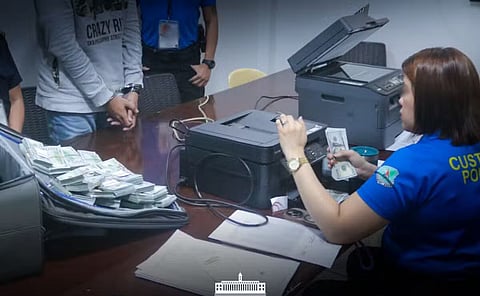Philippines: Man held at airport for concealing $580k, ₱1.2 million in luggage
Undeclared cash discovered during a routine X-ray screening of the passenger’s luggage

Manila: A man was apprehended at Ninoy Aquino International Airport (NAIA) for allegedly failing to declare ₱1.2 million and US$580,000 in cash concealed in his checked baggage bound for Hong Kong, the Bureau of Customs (BOC) reported on Thursday.
The undeclared cash was discovered during a routine X-ray screening of the passenger’s luggage.
The arrest took place on Wednesday, June 25, 2025.
“The discovery was made during a routine X-ray screening of the passenger’s checked-in baggage bound for Hong Kong,” the Bureau of Customs (BOC) said in a statement on Thursday.
Upon further inspection, bundles of cash hidden inside the baggage were uncovered, none of which had been declared, violating Philippine customs and foreign exchange laws.
The BOC indicated that the passenger may face charges under several laws, including:
Republic Act No. 10863, or the Customs Modernization and Tariff Act (CMTA), which governs the importation and exportation of goods and imposes penalties for misdeclaration and smuggling (Section 1400 and Section 1401). Under this law, unlawful importation or exportation, including concealment of goods, is punishable by imprisonment and fines.
Republic Act No. 7653, the New Central Bank Act, which regulates foreign exchange transactions and the movement of foreign currency.
Republic Act No. 9160, or the Anti-Money Laundering Act, which penalises the concealment or misdeclaration of large amounts of cash to prevent illicit financial activities.
Passenger not identified
The BOC did not disclose the identity of the passenger but emphasised that the case will be pursued under the applicable laws.
Under Philippine law, misdeclaration occurs when there is a false, untruthful, or inaccurate statement regarding the quantity, quality, description, or value of goods — including currency — resulting in a discrepancy between the declared and actual duties and taxes owed.
Specifically, when a person fails to declare the correct amount or value of currency being imported or exported, it constitutes misdeclaration. This leads to underpayment or evasion of customs duties and taxes, which is penalised under the law.
The Bureau of Customs (BOC) imposes a surcharge equivalent to 250% of the duties and taxes due if the discrepancy is 10% or more.
If the misdeclaration is found to be intentional or fraudulent — such as submitting false documents or knowingly providing false information — the surcharge increases to 500%, and the goods (in this case, undeclared currency) are subject to seizure and forfeiture.
Moreover, a discrepancy exceeding 30% between the declared and actual value is considered “prima facie” evidence of fraud, triggering stricter penalties and seizure proceedings under Section 1113 of RA 10863.
The law also mandates that goods subject to fines or surcharges are only released upon full payment of these penalties.
The BOC continues to enforce strict surveillance and inspection measures at ports of entry to protect customs revenue and prevent smuggling and money laundering activities.
Sign up for the Daily Briefing
Get the latest news and updates straight to your inbox



